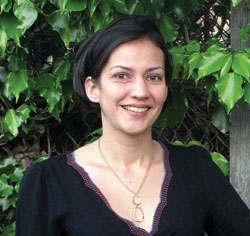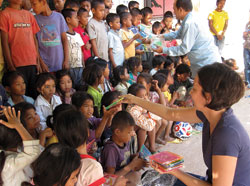Fundraising Without Borders

Ms. Ortega visits Cambodia, where funds raised from her nonprofit organization have helped create a youth soccer team, paid teachers at a computer learning center, and refurbished dorms at a child protection center

When Sara Ortega, BA '03, transferred to GW as a sophomore, she was a native Californian who was, in her own words, "not super-exposed to the world." In fact, she says, "the hardest part of [transferring] was getting on the plane."
That's certainly no longer the case. As the executive director of Mira, an online fundraising nonprofit based in San Francisco, Ms. Ortega now connects small-scale international aid projects—all associated with youth education—with Internet donors. Organizations in Cambodia, funded in part by Mira, have helped create a youth soccer team, paid teachers at a computer learning center, and refurbished dorms at a child protection center.
Mira owes its existence to Ms. Ortega's late-blooming taste for travel—which, she says, was a direct result of her experience at GW. "When I came to GW and I saw all of these students and teachers from everywhere—just name a place—and all of these people were accessible and friendly and approachable…it was the most eye-opening experience."
Traveling thousands of miles is not the challenge it once was. Ms. Ortega recently visited Cambodia to see where the funds she had facilitated were going, an experience she calls "one of the most moving of my life." It was also, she adds, preferable to the sometimes tedious office work involved in setting up a functioning nonprofit organization: "waiting for hours on the phone with the IRS and being transferred to 17 people and all those fun things."
Even Mira's origin demonstrates how thoroughly Ms. Ortega has conquered any anxiety she ever had about facing unfamiliar cultures. Although her current focus is on Southeast Asia, Ms. Ortega and her colleagues actually conceived of Mira while working at a computer school in Ghana. She has plans, too, to expand to projects in Latin America.
The "international awareness" of Ms. Ortega's colleagues at GW was not, she adds, the only way in which the university inspired her career in service. Specifically, she remembers a comment from sociology professor Kate Miller, who said in her closing speech to her students, "It's easier to get to the top when you start at the top."
"It was just such a simple phrase," Ms. Ortega recalls, "but I thought, 'Wow!' … it was a reminder that we were able to go to GW, and most of the world isn't."
—Ruth Steinhardt
